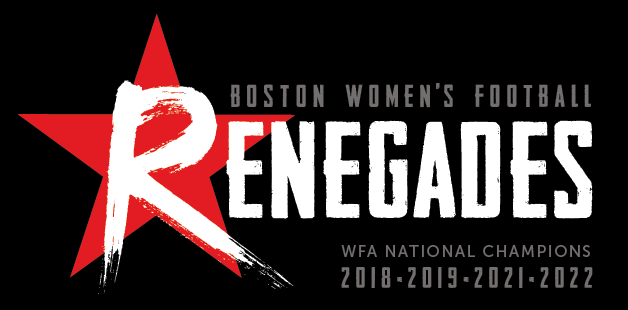By Shira Springer, Boston Globe staff.
February 8, 2015 — Two Super Bowl-winning pro football teams call Greater Boston home. Don’t worry. You didn’t miss a second duck boat parade down Boylston Street.
In August, the women’s full-contact football team formerly known as the Boston Militia capped an undefeated season (11-0) with the 2014 Women’s Football Alliance title. You want a dynasty? The team has won three championships in the last five years and posted a 67-6 record over seven seasons, including playoff games. Say what you want about the level of competition or a lack of parity, but the women practice long hours, play hard, and do their jobs, too.
Given such success, the team fully expected a return trip to the national championship game this upcoming season. But a month ago, a Facebook post broke unbelievable news and put any thought of a title defense on hold. Car dealer Ernie Boch Jr., who owned the team for seven years, wrote: “It is with heavy heart that I announce the discontinuation of the Boston Militia.” He didn’t like where the league was headed with a limited number of teams in the Northeast and a reduced schedule in recent years. Not surprisingly, female full-contact football players don’t give up easily, though the same could be said for female athletes the world over who constantly fight for opportunities to play. Determined to play on, the disbanded Militia and their alumni decided to start a new women’s football organization from the ground up with a new name, a new logo, and a new mission. They show how far women will go to stay in the game, to compete.
The new name will be the Boston Renegades. The new mission will focus on winning games and encouraging women and girls to break barriers through football. The Renegades want to grow the women’s side of the sport and build a bigger following with grassroots efforts. They envision football clinics at Dilboy Stadium in Somerville where they play home games. The clinics will be open to boys and girls because, as former player Molly Goodwin said, “it’s important for boys to have opportunities and see that girls can do this, too.”
Goodwin along with fellow former players Erin Baumgartner and Mia Brickhouse led the Renegades launch. The trio took over team management in early January. Ever since, it’s been a whirlwind of phone calls, equipment cataloguing, and financial planning.
“It’s going to be a different team now, but with the same total commitment to kicking ass,” said Baumgartner. “We still get to strap on cleats and put on helmets and work hard to be the best we can be in our sport. That’s despite the fact that people in the sport don’t get a lot of attention, despite the fact that people don’t think women can play football, despite the fact that people think we’re in the lingerie league.”
Whenever someone asks Baumgartner if she’s in the lingerie league, she laughs it off. Then, she explains that the women’s game is “exactly the same game they’re used to watching with the Patriots.”
By now, there’s probably been some eye rolling, maybe some snickering about women playing tackle football. I’m sure mentioning Women’s Football Alliance titles in the same breath as the Patriots’ Super Bowl victories constitutes sports sacrilege in some quarters.
Save the arguments about how women’s sports — football, soccer, basketball, hockey, baseball, etc. — lack the excitement, the speed, the power, the skill level of men’s sports for someone else. Too often fans focus on what women’s sports lack rather than what is there.
You want passion for football? Sure, you can watch replays of Tom Brady jumping up and down after Malcolm Butler made the Super Bowl XLIX-clinching interception.
But I’ll take linebacker Jenny Olivieri, a 42-year-old mother of three who started playing more than three decades ago in Pop Warner, or running back Whitney Zelee, who returned from a broken leg and rushed for more than 1,500 yards last season, or any other Renegades player. Why? Because passion for football isn’t always what 114.4 million television viewers see during the year’s biggest game. Sometimes it’s what you don’t see or don’t know.
Consider this: The Renegades practice from 8:30-10 p.m. after days spent working at full-time jobs as lawyers, teachers, and engineers and taking care of kids. Each player supplies her own pads and pays a $500 fee that covers helmets, home and away jerseys, and practice uniforms. The team takes 20-hour, round-trip bus rides to games in the Midwest. Six players cram into hotel rooms to save costs on road trips.
And give the Renegades credit for how they dived into preparations for the 2015 season uncertain what the future holds.
Without the financial backing Boch provided, the team is fund-raising to defend its title. Goodwin and her fellow alumni figure it will take $150,000 to get through the season. And that figure only covers basic expenses such as field rental, game-day operations, league dues, regular-season travel, and insurance. If the Renegades reach the league championship game this season, they may not field a full team. The game will be played in Los Angeles, likely requiring players to pay for their flights. Players who can pay will go. Players who can’t may miss the game.
“I’m scared to death to see how we’re going to figure this season out,” said Goodwin, a financial planner by day. “But from everything I’ve seen, from the community, the team, the coaching staff, the alumni, there’s no way the season won’t happen. It’s just a matter of how, and how quickly can we get everything ready. It gives us something to rally around. It’s not about having big money behind you. It’s not about having a big crowd. It’s about the love of the sport.”
(Click here for PDF of this article as it appeared in the Globe.)

